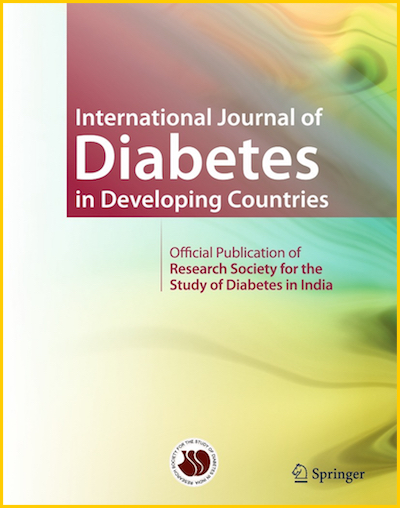GLOBAL DIABETES BREAKTHROUGH: CLINICIANS DEMONSTRATE ABILITY OF CSN WEIGHT LOSS PROGRAMME TO INDUCE DIABETES REMISSION
Type 2 Diabetes No Longer a Death Sentence
CSN Clinical Study Published in the International Journal of Diabetes in Developing Countries
The CSN Weight Loss Programme, developed in South Africa, has the potential to radically transform the nutritional management of type 2 diabetes. In a clinical study published by the International Journal of Diabetes in Developing Countries researchers from the University of the Free State showed that diabetes remission is an attainable objective in some patients with type 2 diabetes mellitus even after years of insulin-treatment by submitting these patients to the CSN programme.
It is estimated that 5.2 million South Africans suffer from type 2 diabetes with an additional 5 million people being at risk of developing type 2 diabetes in the near future [1]. Lifespan is significantly shortened in people with type 2 diabetes with heart attacks, stroke and kidney failure being the leading causes of death [2]. Experts from around the world agree that excessive body weight is the leading cause of type 2 diabetes [3]. In South Africa 20% of people are overweight (BMI of 25-29.9 kg/m2) while an additional 11% are obese (BMI >30 kg/m2) [1].
Mr Christo Strydom, the developer and architect of the CSN Weight Loss Programme, observed that numerous overweight and obese patients with type 2 diabetes were able to reduce the dose of or even discontinue medication including insulin after drastic weight loss achieved by following his programme. The University of the Free State agreed to investigate this observation in a scientific study.
Doctors encourage newly diagnosed people with type 2 diabetes to lose weight and to increase their physical activity [4]. This approach is rarely effective and most patients end up taking tablets to control their blood sugar levels and more than 30% end up injecting themselves with insulin as well [4,5]. Furthermore, patients with type 2 diabetes find it particularly difficult to lose weight [6]. It is also a well-known fact that some medication used to control blood sugar levels including insulin, contribute to weight gain [4].
Under the guidance of Prof. Willie Mollentze severely obese men with type 2 diabetes using insulin injections for at least a year were allocated to the CSN Weight Loss Programme while the same amount of control subjects received standard medical nutrition therapy. Both groups were followed for 6 months.
A unique finding of this study was that complete diabetes remission (blood sugar levels returning to normal without any medication) was documented in the CSN Programme intervention group along with partial diabetes remission. Diabetes remission did not occur in any of the control subjects. Average weight loss in the CSN Programme intervention group after 6 months was 540% more than that in the control group (9.6% compared to 1.5%). The average blood sugar levels of the patients following the CSN Programme were significantly lower after 6 months compared to those patients allocated to the traditional eating plan. It was of great clinical significance that patients on the CSN Programme could reduce their average dose of insulin by 50% while the average dose of insulin in the control subjects had to be increased by 27% in an attempt to normalise blood sugar levels.
Other Findings of Note
Other findings of note in the CSN Programme intervention group were a significant improvement in cholesterol levels, improved exercise capacity and quality of life, and a substantial reduction in the 10-year risk of coronary heart disease at the end of the study. An important observation in the intervention group was a significant reduction in resting heart rate after 6 months compared to baseline. During the study fewer episodes of low blood sugar levels occurred in the intervention group compared to the control group. The researchers concluded that the CSN Weight Loss Programme was safe and effective as administered in their study.
This study differed from other weight loss trials in that all diabetic patients were on insulin therapy. It is also the first time globally that diabetes remission was reported in a commercial weight loss trial at completion. This study also confirms the fairly recent observation that type 2 diabetes is not necessarily, as was previously believed, an irreversible condition.
More information about the CSN trial including the full publication can be found at the publisher’s (Springer’s) website:
References
- Shisana O, Labadarios D, Rehle T, Simbayi L, Zuma K, Dhansay A, et al. South African National Health and Nutrition Survey (SANHANES-1):2014 Edition. Cape Town: HSRC Press.
- Nojilana B, Bradshaw D, Pillay-van Wyk V, Msemburi W, Laubscher R, Somdyala NI, Joubert JD, Groenewald P, Dorrington RE. Emerging trends in non-communicable disease mortality in South Africa, 1997 – 2010. S Afr Med J.2016 Apr 1;106(5):58. doi: 10.7196/SAMJ.2016.v106i5.10674.
- Bellou V, Belbasis L, Tzoulaki I, Evangelou E. Risk factors for type 2 diabetes mellitus: An exposure-wide umbrella review of meta-analyses. PLoS ONE 13(3): e0194127. https://doi.org/10.1371/journal.pone.0194127.
- The Society for Endocrinology, Metabolism and Diabetes of South Africa Type 2 Diabetes Guidelines Expert Committee. The SEMDSA 2017 Guidelines for the Management of Type 2 diabetes mellitus. Journal of Endocrinology, Metabolism and Diabetes of South Africa. Vol 22(1):S1-S182
- Pinchevsky Y, Raal F, Butkow N, Chirwa T, Distiller L, Rothberg A. Quality of care delivered to type 2 diabetes mellitus patients in public and private sector facilities in Johannesburg, South Africa. Int J Gen Med.2018 Oct 2;11:383-390. doi: 10.2147/IJGM.S165545. eCollection 2018.
- Van Gaal L, Scheen A.Weight Management in Type 2 Diabetes: Current and Emerging Approaches to Treatment. Diabetes Care.2015 Jun;38(6):1161-1172.




